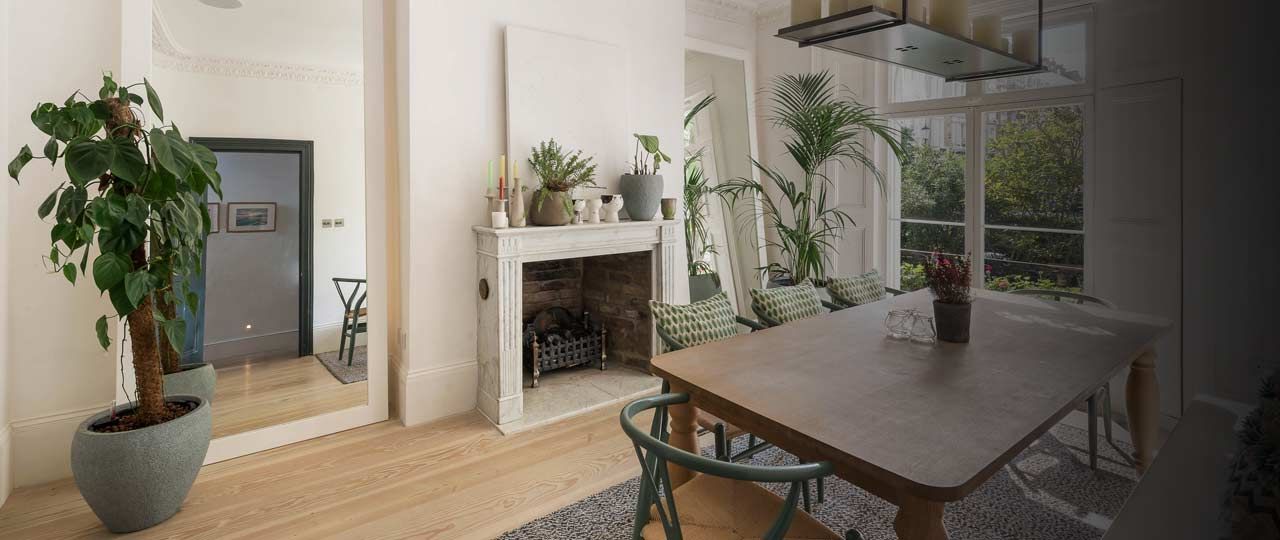
We look at the health benefits of houseplants, how they can help your home appeal to renters and buyers and which plants are suited to different rooms.
Plants can breathe life and colour into a property and make it feel more like a home. Certain varieties improve air quality and release a subtle, natural scent that beats any artificial air freshener. All of which can make your potential buyers or renters feel more comfortable and at home in your property.
Here are five ways in which houseplants can improve your health, along with a selection of plants for every room of your home.
Purify the air
Pollution levels are typically higher indoors than outdoors due to the mix of outdoor pollutants with indoor contaminants such as Volatile Organic Compounds (VOCs). VOCs are emitted from furnishings, paints and even detergents. Opening windows and ensuring natural ventilation can help improve indoor air quality, but this isn’t always possible or appealing, particularly in winter.
A 1989 NASA study determined that household plants could help remove chemicals such as benzene and formaldehyde from the air and reduce “sick building syndrome”, and since then the evidence for the use of houseplants as air purifiers has increased. Some plants are particularly good at removing specific contaminants, for example, English ivy has been shown to reduce airborne mould by up to 78 per cent.
Increase concentration and productivity
Research has shown that people performed better at attention-based tasks when surrounded by plants. One study found that incorporating plants into a workspace could help improve productivity by up to 15 per cent. The theory is that when our attention shifts to the plants on our desk, it provides a micro-break from our computer screens that can help boost our concentration.
Relieve stress and anxiety
Being in nature has been proven to reduce stress levels and rejuvenate your body and mind. It may not be the same as walking through a forest but bringing plants into your home can help you relax at the end of a long day. The power of plants to clean the air also helps improve your overall health, enabling you to better deal with stress.
If you struggle with anxiety, lavender’s scent has been proven to lower heart rate and blood pressure and improve sleep. It’s commonly found in essential oils and room sprays, but a pot plant is just as good.
Boost your mood in winter
The dark cold winter months can be a taxing time, particularly if you suffer from Seasonal Affective Disorder (SAD). Flowers and greenery can help perk you up and keep you positive. Winter jasmine is an indoor plant with a delectable scent and white flowers that come out during the winter months. The colourful orange flowers of the Goldfish Plant will brighten up gloomy winter days and remind you that spring is just around the corner.
Help you sleep
The amount and quality of sleep we get has a huge impact on our health. There are two ways in which plants can help you get a good night’s sleep: by purifying the air in your bedroom and by giving off a scent that helps you relax.
Plants such as snake plants, orchids and aloe vera give out oxygen at night to help you breathe better as well as absorbing toxins from the air. For a sweet smell to help you sleep, choose jasmine or lavender.
Pick the right plant for every room
Living rooms: peace lilies and philodendrons. The peace lily is a low-maintenance plant with an attractive white flower that absorbs indoor air pollutants. They can grow up to three feet tall with big, bold leaves. Philodendrons are another air purifier and with both vining and upright varieties, there’s lots of scope for incorporating them into your décor.
Bedrooms: orchids and snake plants. Most plants emit oxygen during the day when they’re photosynthesising, but when the sun goes down, they start to release carbon dioxide. Orchids and snake plants do the reverse and give out oxygen at night, which makes them perfect night-time companions.
Bathrooms: air plants and ferns. Bathrooms need plants that love moisture and heat and can cope with low light conditions. Air plants are virtually impossible to kill, don’t need soil and can get most of the water they need from the air in a moist environment. Boston ferns are a classic bathroom plant and thrive in the filtered light and moist air.
Hallways: dwarf kaffir lime trees. Say goodbye to chemical air fresheners and be greeted by a wonderful fresh smell every time you walk into your home. You can also use the leaves of the kaffir lime tree as an ingredient in Asian dishes.
Kitchens: aloe vera. Aloe vera has the dual benefits of being a healing plant and one that is almost impossible to kill. Rub the gel-filled interior of the leaves on scrapes and burns for an instant cooling effect.
Offices: Gerbera daisies and spider plants. Gerbera daisies will add a splash of colour to your office as well as helping to remove toxins from the air, particularly those associated with ink. If you’re not very green-fingered then spider plants are hard to kill and propagate readily – if you’re so inclined, you could end up surrounded by them.
